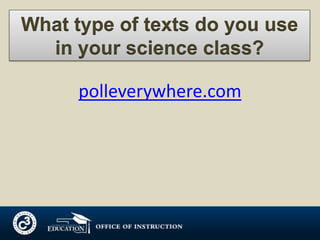
REAC3H Summit Science Session
- 1. What type of texts do you use in your science class? polleverywhere.com
- 2. CCSS Literacy & Scientific Practices
- 3. 8 Scientific & Engineering Practices The practices describe behaviors that scientists engage in as they investigate and build models and theories about the natural world and the key set of engineering practices that engineers use as they design and build models and systems. The intent is to better explain and extend what is meant by “inquiry” in science.
- 4. 8 Practices Process Standards ① Asking Questions and Observe and Measure Defining Problems ② Developing and Using Models Classify ③ Planning and Carrying Out Investigations ④ Analyzing and Interpreting Experimental Design Data ⑤ Using Mathematics and Computational Thinking Interpret and ⑥ Constructing Explanations Communicate and Designing Solutions ⑦ Engaging in Argument from Evidence Model ⑧ Obtaining, Evaluating, and Communicating Evidence Inquiry
- 5. 8 Practices Literacy ① Asking Questions and Reading Defining Problems Read closely make logical ② Developing and Using inferences; cite textual Models evidence ③ Planning and Carrying Out Determine central ideas Investigations Analyze ④ Analyzing and Interpreting Interpret words and Data phrases ⑤ Using Mathematics and Analyze point of view and Computational Thinking purpose ⑥ Constructing Explanations Delineate and evaluate and Designing Solutions the argument and ⑦ Engaging in Argument from specific claims in a text Evidence Read and comprehend ⑧ Obtaining, Evaluating, and complex informational Communicating Evidence text
- 6. 8 Practices Literacy ① Asking Questions and Writing Defining Problems Write arguments and ② Developing and Using support claims in an Models analysis using valid reasoning and relevant ③ Planning and Carrying Out sufficient evidence Investigations Write informative text to ④ Analyzing and Interpreting convey complex ideas Data Conduct short as well as ⑤ Using Mathematics and more sustained research Computational Thinking projects based on focused questions ⑥ Constructing Explanations and Designing Solutions Gather relevant information from multiple print and ⑦ Engaging in Argument from digital sources Evidence Draw evidence from ⑧ Obtaining, Evaluating, and informational text to Communicating Evidence support analysis
- 7. Informational Text in Science Classrooms 1. Type 2. Source 3. Placement
- 8. Text Type Balancing Literature/Narrative Text and Informational Text scboces.org
- 10. Informational Text Sources Argumentative/Opinion Informative/Explanatory
- 11. Informational Text Sources Argumentative/Opinion Informative/Explanatory • News Articles • Textbooks • Blogs • Journal Articles • Trade books
- 12. Expert Groups • TEXT A • TEXT B – Both groups • ? = By any sentence or paragraph that prompts you to ask a question • X = By any sentence or paragraph that provides you an explanation for a question you previously had
- 13. What I can do What I can say I am going to think about what the I’m not sure what this about, but I think it may mean.. selected text may mean. This part is tricky, but I think it means… After rereading this part, I think it may mean I am going to summarize my What I understood about this reading so far is… understanding so far. I can summarize this part by saying… The main points of this section are… I am going to use my prior knowledge I know something about this from… to help me understand. I have read or heard about this when… I don’t understand the section, but I do recognize… I am going to apply related concepts One reading/idea I have encountered before that relates and/or readings to this is… We learned about this idea/concept when we studied The concept/idea is related to…
- 14. Resources • Understanding Language Project Stanford University – Clarifying Bookmarks: Start on page 75
- 15. Article A Article B Similar Features Different Features Different Features
- 16. Graphic Organizers • Graphic Organizers
- 17. Science Text Should… 1. Engage students to ask ?s 1. Serve to answer ?s that students generate
- 18. Placement of text Does the text type and placement of text matter in a 5E Lesson? Explain… Engage Explore Explain Elaborate Evaluate
- 19. The 5Es Phase Purpose • Capture students’ interest, uncover what students know and think about a topic, Engage and determine student misconceptions. • Provide cooperative exploration activities, give students common concrete experiences that help students begin to construct concepts and build skills. Explore • Provide hands-on experiences you can use later to formally introduce concepts, processes, and skills. • Students articulate their ideas in their own words and listen critically to one another’s ideas. • The teacher clarifies concepts, corrects misconceptions, and introduces Explain terminology. • It is important to clearly connect the students’ explanations to experiences they had in the engage and explore phases. Elaborate • Students apply their understanding of the concept learned to a new situation. • Evaluate students’ understanding of concepts and their proficiency with various Evaluate skills. • Opportunity for students to assess their own understanding and skills.
- 20. Designing a 5E Lesson & Integrating Text “Why does the moon look different on different nights?”
- 22. Texts
- 23. Placement of text Engage Explore Explain Elaborate Evaluate
- 24. Engage Explore Explain Elaborate Evaluate
- 26. Make the argument that your your text selections and placement represent authentic use of text in science?
- 27. Science Textbooks According to Tyler Dewitt • Tyler Dewitt TED TALK
- 28. Text Resources • http://www.sciencenews.org/ • http://www.sciencenewsforkids.org/ • http://www.sciencedaily.com/ • http://kids.nationalgeographic.com/kids/ • http://www.nationalgeographic.com/
Notas do Editor
- What type of text would you utilize in each of the phases and why?
- What type of text would you utilize in each of the phases and why?